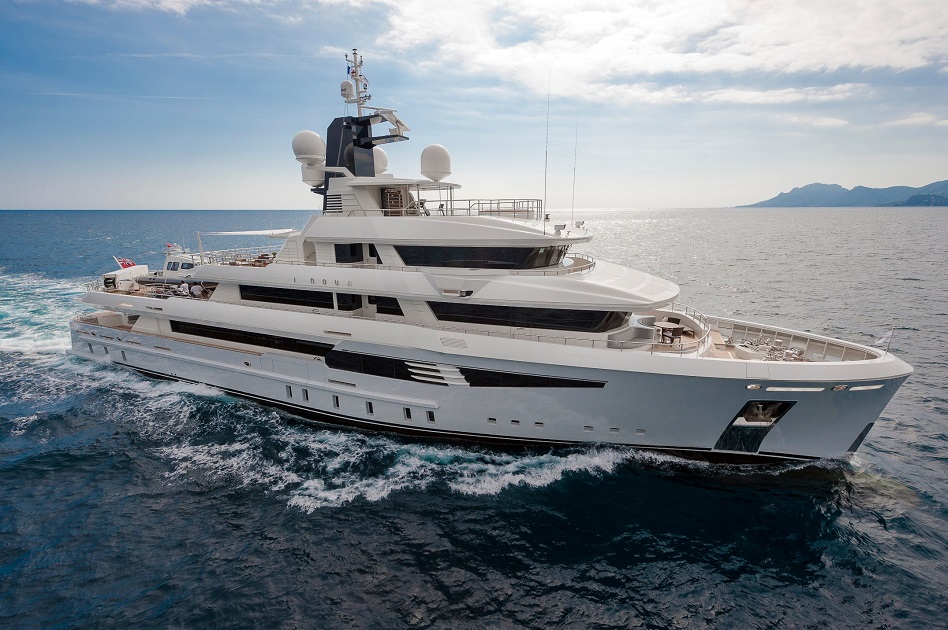So you want to buy a yacht? There’s a lot to think about before you sail off into the sunset. Words by Zoe Dickens.
What type of yacht best suits your needs? Should you go for brokerage or new build? And how are you going to pay for it?
There's some key advice every first-time buyer should know.
First choose your yacht (and your broker)
Decide if you’re going to buy from the brokerage market or commission a new build.
For obvious reasons, most first-time buyers choose the former. While you may have to compromise in certain areas, you can see exactly what you’re getting.
Current market highlights include 49-metre explorer I Nova (pictured), the recently refitted Regina d’Italia II, and the magnificent blue-hulled Sunrays.
You’ll also need to decide if you want to buy privately or go through a broker.
“A broker that can advise you on the type, availability and price of yachts, be honest and discourage bad buys is your best friend.
“If you don’t understand the market well then use a broker.”
This is the advice from John Leonida, partner at superyacht-specialist law firm Clyde & Co.
And, while there’s no escaping the fact that broker fees are expensive, finding a good Motor Yacht Brokers Association-accredited (MYBA) broker can save you a lot of time and money.
“It’s in our interest to fight for the best deal for our client and create a relationship that will see them return when they want to upgrade,” says Jim Evans, managing director of SuperYachtsMonaco.
“It’s like property. If you’re buying a substantial piece of real estate you want your own agent. You don’t want to rely on the seller’s agent.”
Brokers, Evans says, can be especially useful if you’re building a yacht.
A custom yacht build takes around three years. A good broker will visit the yard regularly to check on quality and fight your corner should any unexpected costs occur.
Finding a bank
Around 90 per cent of superyacht owners self finance because, if you’re worth $500+ million (as most owners are), do you really need a mortgage?
The most common reason for financing is to keep capital available for more profitable use elsewhere.
So, if you do decide to go down this route, you’ll need to find a bank.
Pre-2008, this would have been as simple as calling RBS or Bank of America. But, post-crash, Credit Suisse, BNP Paribas and JP Morgan are among the few still offering yacht loans. Usually it's a loan of no more than 60-70 per cent of a yacht’s value.
Unlike property, yachts do not have to undergo surveys and valuations.
But, most banks will require them, along with warranties and personal guarantees.
In many cases, they’ll also want to put a tracker on the yacht, along with regular access, to ensure proper maintenance.
Securing a loan against a new build can require extra assurances, as the length of time and number of players create extra risk (for example, the yard going under).
Building at a blue chip yard, such as Lurssen or Heesen, will go some way to mitigate this.
“A yacht purchase involves many different elements and parties so there is a lot that can go wrong,” says Alex Koersvelt, commercial director at Mayfair-based brokerage firm Edmiston.
“Getting an expert broker in to manage this process, ask the right questions, do due diligence and keep all parties focused on the ultimate goal is beneficial to both buyer and seller.”
Assembly your expert team
In spite of the usefulness of a good broker, Leonida warns you should be careful as to the extent of their responsibility.
“We’ve recently been involved with a number of yacht sales litigations and the common factor is the owner allowing their broker to draft the Memorandum of Agreement (MOA).”
The MYBA MOA is a standard document used in any yacht sale. But, Leonida explains, it is far from perfect and needs multiple addenda to reflect the deal being done.
He recommends that a buying team should include an independent broker, lawyer and surveyor, and stresses that correspondence with your lawyer should be kept private to protect client privilege should something go wrong.
“Our job is to make sure that the pieces of paper reflect the deal being done, and that the promises being made are capable of being delivered,” Leonida says.
“A multimillion-dollar deal can collapse over something as simple as a missing document. It’s a lawyer’s job to make sure that doesn’t happen.”
This article appeared first in the Mayfair Times.
Or Cruise Control about a special summit on the eve of the Monaco Yacht Show.













